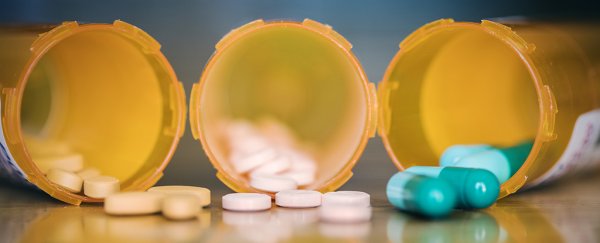Dosing medicines can be a tricky process: How much of a medication actually ends up hitting its target can vary a lot between patients, sometimes for mysterious reasons. As it turns out, even the things living in our bodies could be gobbling up our drugs.
In a series of experiments with levodopa (L-dopa) drug treatments for Parkinson's, a new study has found that the gut microbes Enterococcus faecalis and Eggerthella lenta can intercept L-dopa and chemically transform it before it reaches the brain.
While this research only focuses on a specific treatment for one condition, the team behind the work thinks we might be underappreciating the role that our gut microbiome plays in controlling the efficacy and potency of medicines.
"Maybe the drug is not going to reach its target in the body, maybe it's going to be toxic all of a sudden, maybe it's going to be less helpful," says chemical biologist Maini Rekdal from Harvard University.
The job of L-dopa is to deliver dopamine to the brain, replacing the dopamine eaten up by Parkinson's. However, since the introduction of L-dopa in the 1960s, scientists have known that enzymes in the gut can stop this delivery from happening, leading to some nasty side effects as dopamine "spills out" before reaching the brain.
A second drug, carbidopa, was introduced to keep L-dopa intact, but it doesn't always seem to help. Even with this additional drug, the effectiveness of L-dopa can vary between patients. What this new research does is identify the specific bacteria to blame, out of trillions of potential species.
With reference to the Human Microbiome Project, the team found that not only our own gut enzymes can wreak havoc on the medication, but the bacterium E. faecalis can also convert L-dopa to dopamine before it reaches the brain. Sure enough, it ate up all the L-dopa in lab tests.
Using faecal samples and supplies of dopamine, the researchers identified that another strain of gut bacteria, E. lenta, then consumes the converted dopamine and produces the neuromodulator meta-thyramine as a byproduct.
Thus, E. faecalis and E. lenta are apparently working as a sort of microbe tag team, preventing the medication from reaching its target. Furthermore, while carbidopa is used to stop a human gut enzyme from converting L-dopa to dopamine in the digestive system, it doesn't seem to work on the E. faecalis enzyme that's doing the same.
The good news is that the researchers have already found a molecule, alpha-fluoromethyltyrosine (AFMT), that can stop E. faecalis from breaking down L-dopa without destroying the bacterium itself, by targeting a non-essential enzyme.
Ultimately, we might end up with a way of making L-dopa significantly more effective as a Parkinson's treatment, without as many of the side effects – but that's still a long way off.
"All of this suggests that gut microbes may contribute to the dramatic variability that is observed in side effects and efficacy between different patients taking L-dopa," says chemical biologist Emily Balskus from Harvard University.
Even if we can't fix the problem just yet, we now have a proof of concept that particular combinations of gut microbes can indeed cause havoc with our meds. Hopefully, this will give other researchers food for thought and we might see similar investigations of other medicines, too.
The research has been published in Science.
